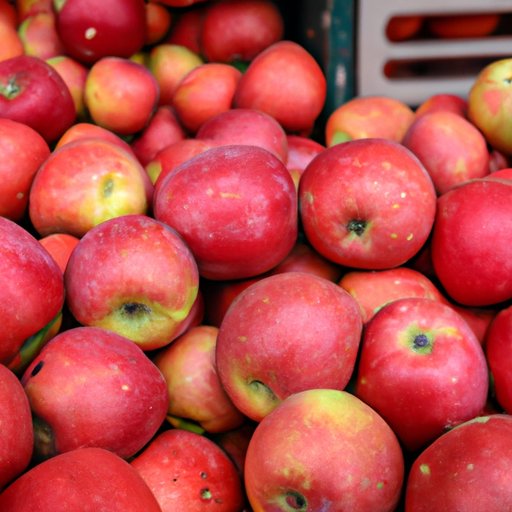
Introduction
Have you ever bought a bag of fresh apples only to find them bruised and brown after a few days? Storing apples properly is essential to preserve their longevity and keep their taste and texture at peak quality. In this article, you’ll learn how to store apples effectively to keep them fresh and delicious for longer.
The Science behind Apple Storage
Apples are living organisms and are subject to a series of changes after harvesting that can affect their quality and longevity. Apples naturally produce ethylene gas, which can be both helpful and harmful. Ethylene gas can stimulate ripening, but it can also speed up the decay process. Because of this, it’s important to control the gas concentration to help preserve the apples.
Other factors that can affect apple quality are temperature, humidity, and ventilation. Apples need to be stored in a cool and humid place with good air circulation to prevent them from over-ripening or drying out.
Issues that can arise from improper apple storage include bruising, browning, softening, and rotting.
A Step-by-Step Guide on Properly Storing Apples
Step 1: Wash and dry the apples before storage. Clean any dirt particles or residue on the surface of the apples gently with a gentle brush and lukewarm water. It’s important to dry the apples completely before storing them.
Step 2: Sort the apples by ripeness and variety. Apples will ripen at different times, so it’s important to sort them by ripeness to ensure they are eaten at their peak flavor. Apples of different varieties also have different storage needs, so grouping them can help create optimal conditions.
Step 3: Store apples in a cool and humid place. Ideally, apples should be stored at 32 to 40 degrees Fahrenheit with humidity levels of 90%. A refrigerator, cellar, or pantry can all be used to create these conditions.
Step 4: Don’t crowd the apples. Apples require good air circulation to prevent moisture buildup and to help prevent decay. It’s important to space the apples out or store them in ventilated containers.
Maximizing Your Apple Storage
To extend the storage life of your apples, try to avoid bruising and damage to the fruit. Selecting firm apples that are free of blemishes is a good start. You can also use different storage equipment to help preserve apple quality, such as a refrigerator, a root cellar, or a pantry.
If you find bruised or damaged apples, consume them as soon as possible to prevent the spread of decay to the rest of your stored apples.
From Picking to Preservation: How to Store Apples Like a Pro
The journey to proper apple storage starts before you even store them. When selecting and picking apples, choose mature fruit and handle them gently to avoid damage. Once you have your apples home, choose the right containers for storage, such as ventilated crates or bags.
Understanding the right storage temperature is key to maintaining apple quality. For short-term storage, consider using the refrigerator, but for a more extended period, try to keep them in a place with consistent cool temperatures, such as a root cellar.
The duration of storage is also essential. Apples can last for over six months when stored correctly. Keep track of when you bought or harvested your apples to ensure you eat them before their quality decreases.
5 Simple Techniques for Storing Apples to Extend Shelf Life and Retain Flavor
1. Wrap apples individually. This can help prevent gas transfer and minimize the spread of decay.
2. Keep apples in a sealed bag with a damp paper towel to maintain moisture levels. This can also help prevent ethylene gas transfer.
3. Consider separating different apple varieties. Some apple varieties may ripen faster than others and can affect neighboring apples.
4. Check your stored apples regularly for signs of spoilage. Remove any damaged apples before they spread decay to the others.
5. Pick apples at the right time. Apples picked at their peak will last longer and have a superior flavor.
Conclusion
Storing apples properly is essential to preserve their longevity and keep their taste and texture at peak quality. By following these tips and techniques, you can ensure your apples stay fresh and delicious for longer.
Remember to wash and dry your apples before storing them, sort them by ripeness and storage needs, and store them in a cool, humid place with adequate ventilation. Take care not to overcrowd them and avoid bruising or damaging them during storage. Finally, keep checking your stored apples regularly and consume them before they spoil.




